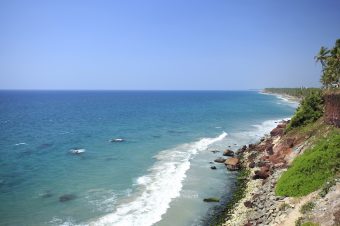
A triple whammy of accelerating sea level rise, ocean warming and acidification is imperilling Pacific Islands, which face growing threats to their socioeconomic viability and indeed their very existence because of climate change.
A scenic view of terraced rice fields with palm trees in the foreground and a mountain range under an illuminated, cloudy sky in the background.
The World Meteorological Organization (WMO) State of the Climate in the South-West Pacific 2023 report details how sea level rise in the region is above the global average. Sea surface temperatures have risen three times faster than the global average since 1980. During that time marine heatwaves have approximately doubled in frequency since 1980 and are more intense and are lasting longer.
The report was released by United Nations Secretary-General António Guterres and WMO Secretary-General Celeste Saulo at the Pacific Islands Forum in Tonga. It was accompanied by a special briefing document on Surging Seas in a Warming World, described by Mr Guterres as “an SOS on sea level rise.”
“A worldwide catastrophe is putting this Pacific paradise in peril,” said Mr Guterres.“ Global average sea levels are rising at an unprecedented rate. The ocean is overflowing.”
More:
- Regional Fora Aim to Increase Country Ambition Ahead of Next Round of Climate Plans
- Islands need resilient power systems more than ever. Clean energy can deliver
- Advancing Earth Observation with the Copernicus Sentinel Expansion Missions
“The reason is clear: greenhouse gases – overwhelmingly generated by burning fossil fuels – are cooking our planet. And the sea is taking the heat – literally.”
Despite accounting for just 0.02 per cent of global emissions – the Pacific islands are uniquely exposed. Their average elevation is just one to two meters above sea level; 90 percent of the population live within five kilometres of the coast and half the infrastructure is within 500 metres of the sea, said Mr Guterres.
But the problem is global, he said.
“Surging seas are coming for us all – together with the devastation of fishing, tourism, and the Blue Economy. Across the world, around a billion people live in coastal areas threatened by our swelling ocean. Yet even though some sea level rise is inevitable, its scale, pace, and impact are not. That depends on our decisions,” said Mr Guterres, reiterating his urgent calls for drastic cuts in greenhouse gas emissions and increasing in climate adaptation.
The 53rd Pacific Island Forum Leaders Meeting’s host nation, the Kingdom of Tonga, is on the frontline of climate change and is exposed to hazards such as tropical cyclones and flooding. It also suffered a massive volcanic eruption which unleashed a basin-wide tsunami in January 2022 and caused a massive injection of water vapour into the Earth’s atmosphere, impacting the global climate.
“Climate change has become a global crisis and is the defining challenge that humanity currently faces. Communities, economies and ecosystems throughout the South-West Pacific region are significantly affected by its cascading impacts. It is increasingly evident that we are fast running out of time to turn the tide,” said WMO Secretary-General Celeste Saulo.
Source: WMO



